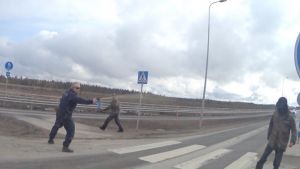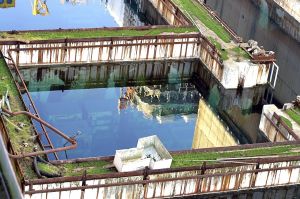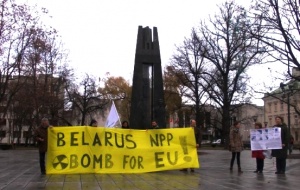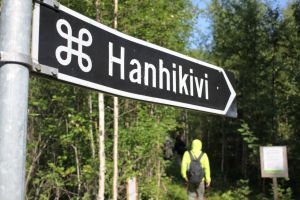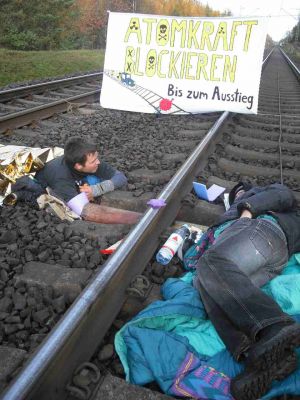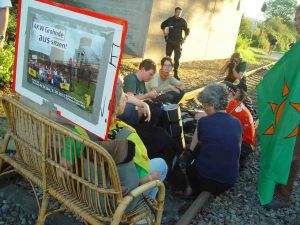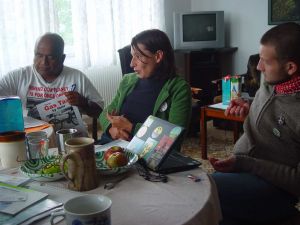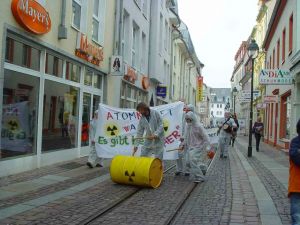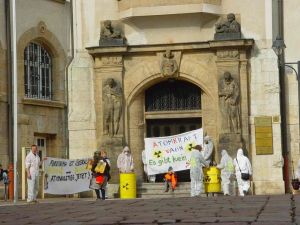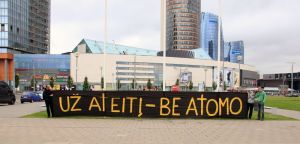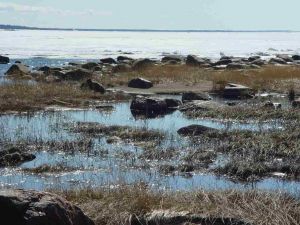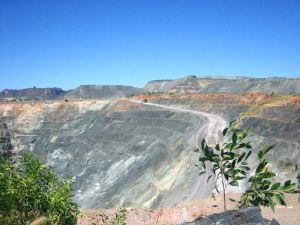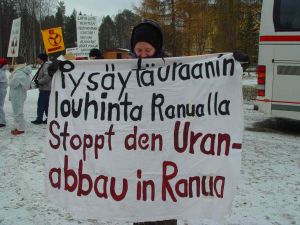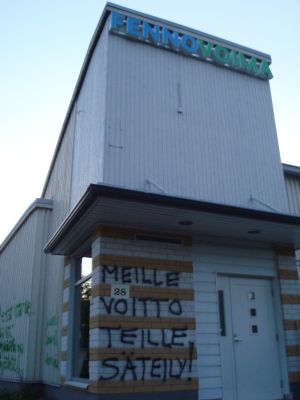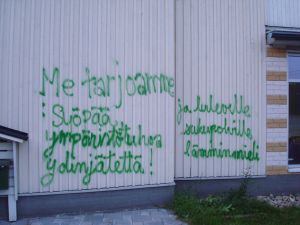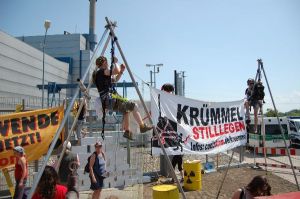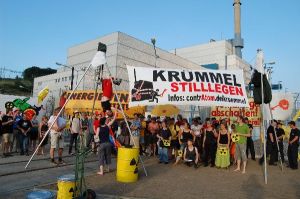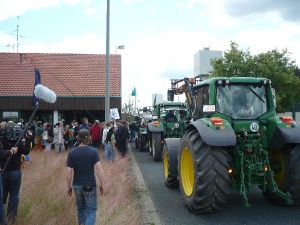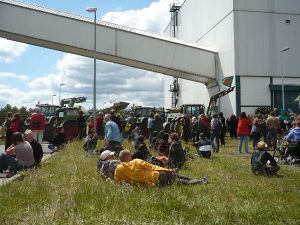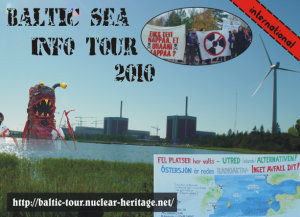Nuclear Heritage Network
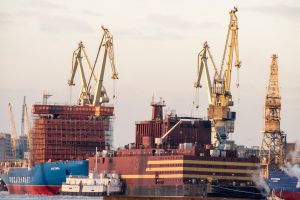 Floating Nuclear Power Plant in the harbor of St. Petersburg (photo: Dmitry Sharomov/Greenpeace ) |
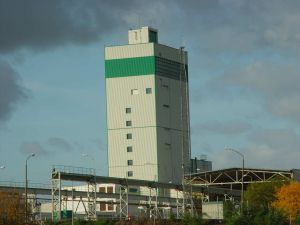 Failed final disposal approach: Morsleben repository (D) |
 Solidarity with our friends in Russia faced to persecution as "foreign agents" - robots demanding for "freedom" |
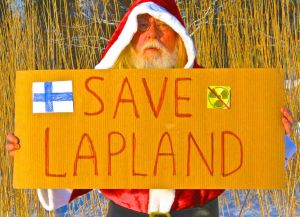 Sokli mine: nature catastrophe is being prepared in Eastern Finland |
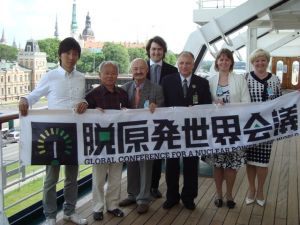 Peace boat stop in Riga (LV) May 22, 2013 |
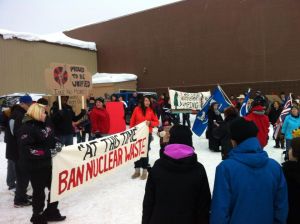 Idle No More - Indigenous protests in Saskatchewan (CA), January 2013 |
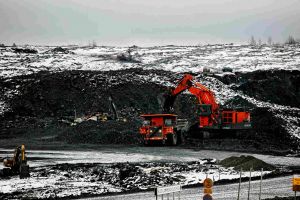 Disaster in Finland: uranium leaks in waste waters from the Talvivaara mine (FIN) to the environment |
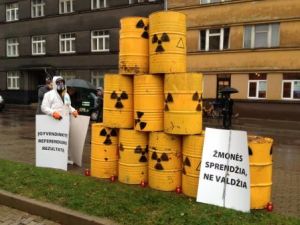 Riga (LV): Action against Visaginas NPP |
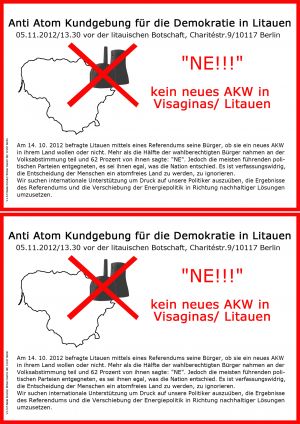 Action against Lithuanian Visaginas NPP in Berlin (D) on November 5th |
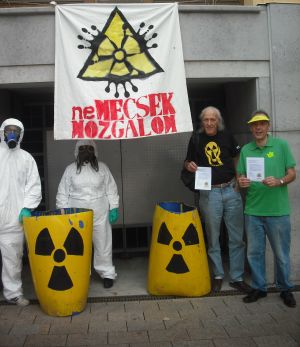 anti-Uranium mine action in Pécs (H) |
 Uranium Action Day took place on September 29, 2012 globally |
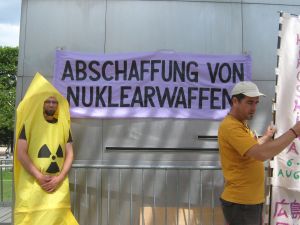 Fasten action against nuclear weapons in Paris (F) in August 2012 |
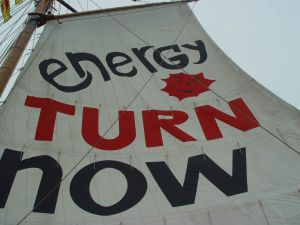 Anti-nuclear sailing trip headed from Stockholm (SE) to Greifswald (D) |
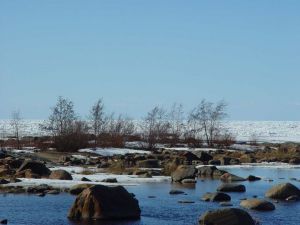 E.on subsidiary announced site selection for Pyhäjoki (FIN) |
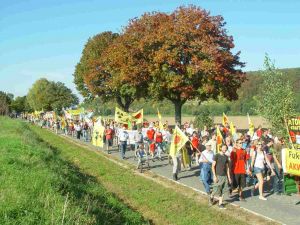 Rally and blockade of the Grohnde NPP (D) |
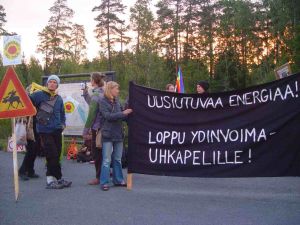 Access roads to the Olkiluoto NPP (FIN) successfully blockaded several times |
 Launching the anti-nuclear art project "25" in Murmansk (RUS) |
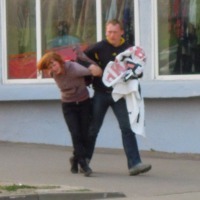 Special police forces arrested 12 activists after an international anti-nuclear action in Minsk (BY) on April 25 |
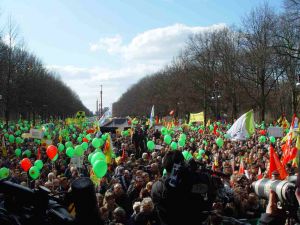 Fukushima demonstration: 250,000 protested in four German cities, 120,000 of them in Berlin |
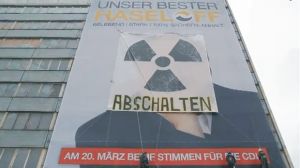 Action in Magdeburg (D): "Shut down" added to huge election banner of ruling pro-nuclear party (video) |
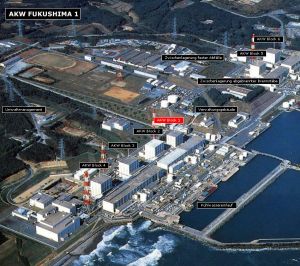 Overview of the nuclear facilities at the site of the NPP Fukushima I - provided by Spiegel Online |
 60,000 protested against nuclear power on 12/3/11 in a human chain between Stuttgart and NPP Neckarwestheim (D) |
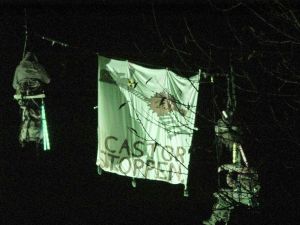 Climbing activists blockade the Castor transport at Morschen (close to Kassel, Hesse, D) |
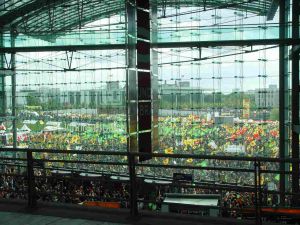 100,000 protested in Berlin against atomic power |
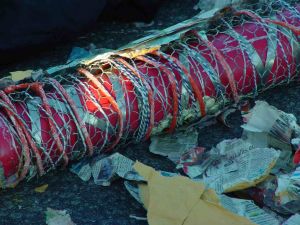 Olkiluoto successfully blockaded in Finland on August 28, 2010 |
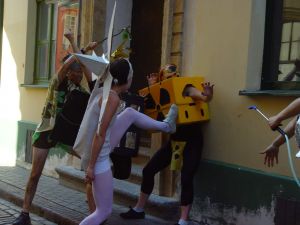 Renewables beating nuclear power in Riga! |
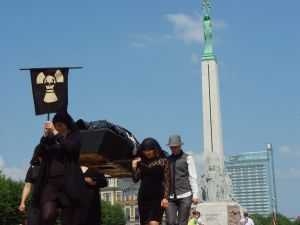 Anti-nuclear funeral action group in front of the statue of liberty in Riga |
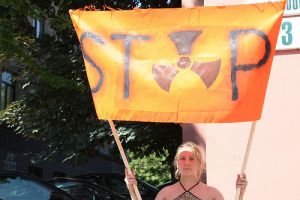 Actions against NPP developments in front of the Polish, Swedish and Finnish embassies in Vilnius |
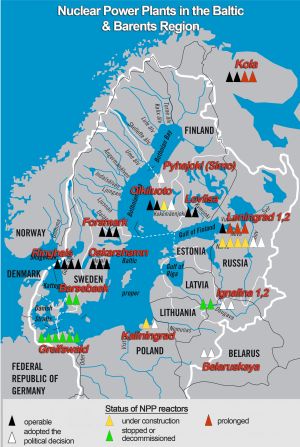 Nuclear power plants around the Baltic Sea |
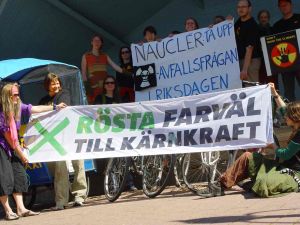 Action in Mariehamn |
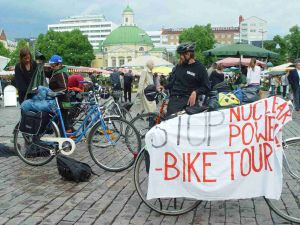 Anti-nuclear Biketour has started in Turku |
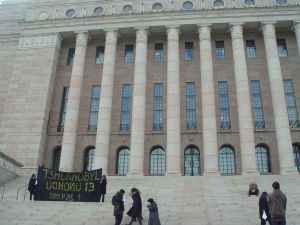 Chernobyl Day action of Women Against Nuclear Power in Helsinki, Parliament |
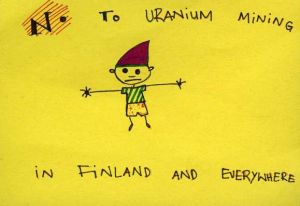 New postcards against uranium mining in Finland in several languages... |
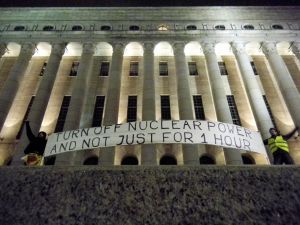 Helsinki (FIN): Action in context of an international network meeting |
 Protests against uranium mining in Finland |
 Russian anti-nuclear campaigner Andrey Ozharovskiy being arrested in Belarus while the hearings for the Environment Impact Assessment of the planned new NPP took place |
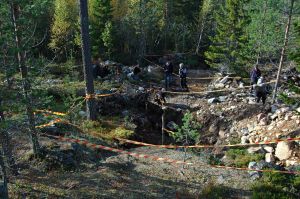 Activists examine the area of Areva's drilling activities |
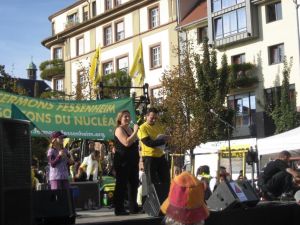 Shut down Fessenheim rally: Kerstin Rudek (BI Lüchow-Dannenberg) and Jean-Yvon Landrac (Sortir du nucléaire) |
 Nuclear Climate Camp: City Hall of Simo - "Sold to the Uranium Capitalism" |
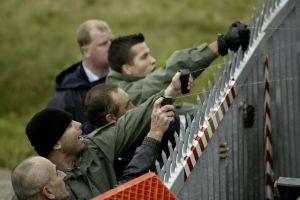 Police violance: Pepper spray against protesters from the Gorleben Treck in Morsleben (Photo: Andreas Conradt / PubliXviewinG) |
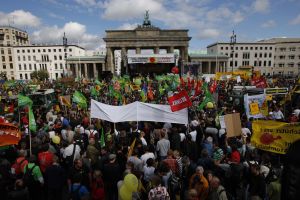 About 50,000 people demonstrated in Berlin against nuclear power (Photo: Andreas Conradt / PubliXviewinG) |
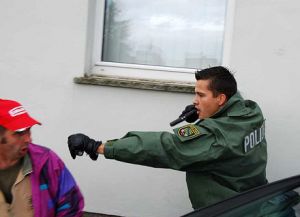 Policeman attacks a farmer in Morsleben with firearm |
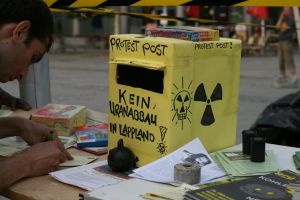 Ranua Rescue Action Day: post box for creative protest |
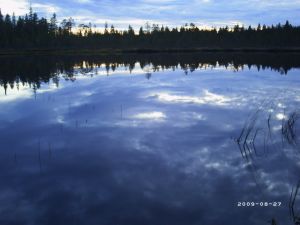 Near the Finnish Community of Ranua a camp has been set up to monitor Areva's mining activities |
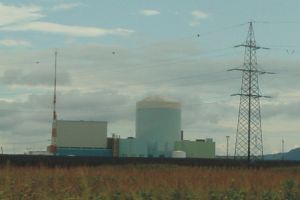 Slovene NPP Krško - visited during the International Network Meeting in Ljubljana |
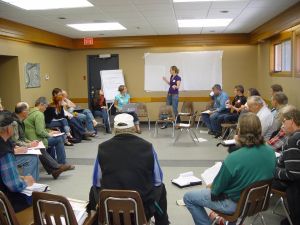 Canada: Tar Sands, new NPP plans & more concerned people at the Land Stewards Gathering in Edmonton |
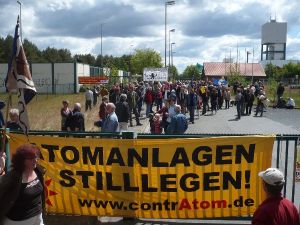 Germany: Some hundreds of activist occupied the illegal Final Disposal Site Gorleben |
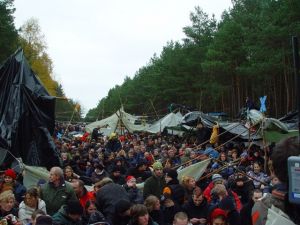 Castor: Mass blockade of thousands of people with tents, tarpaulins and tractors |
| update this gallery |
on this page: UPCOMING EVENTS | NEWS | COMMUNICATION | LINKS
We connect anti-nuclear activists worldwide, provide information regarding nuclear issues and anti-nuclear activities in many countries and develop projects and campaigns. This website provides background information, images, press releases, material and much more. Explore the Nuclear Heritage Network!
This website depends on the contributions of anti-nuclear activists - you can edit pages, add your anti-nuclear contents or publish flyers. Help to extend the contents of our webpage, make translations or corrections and add new topics. The software is based on MediaWiki (similar to Wikipedia).
The Nuclear Heritage Network is more than this website. Once a year we organize international network meetings, there are several mailing lists for communication and several international cooperation projects. We are also developing informational material on local topics in different languages for international use.
Upcoming events
- Castor Resistance in Germany - probably 2024 in France, Germany and United Kingdom
News
Canada: Lifetime extension for North Americas third-oldest NPP planned at Pickering
Faced with strong public concern about the climate consequences of a huge surge in the use of gas-fired power plants, the Ontario Ford government has opted for the highest cost and highest risk response: Extending the life of a nuclear station that has long exceeded its engineering life span. As the third-oldest nuclear station in North America, the Pickering Station has a long history of serious accidents, and its poor performance played a key role in requiring Ontario to ramp up the use of coal-fired power plants in the early 2000s.
Nuclear Energy Conference 2022
The current war in Ukraine is turning the energy systems debate primarily to how to tackle the realistic risk of Russian natural gas cut-off. The list of possible solutions includes accelerated development of renewables and energy consumption reduction schemes. Czech political representatives, in turn, have supported long-term replacement of fossil fuels with investment in nuclear reactors. What are the economic risks associated with new nuclear units? Can we substitute for Russian natural gas and phase out coal combustion without them? Which energy future will be cheaper?
The objective of the international conference NEC 2022 “What Prevents Nuclear Energy Development in Europe?” is to discuss these very issues in detail with international and Czech experts.
Nuclear Energy Conference 2020
The increasingly obvious effects of global climate change and the increasingly urgent warnings of the scientific community against potential severe impacts in the coming decades strengthen the need for public debate about various aspects of the problem. One of them is the possible role of nuclear power in reducing greenhouse gas emissions. The debate on this case is influenced by the fact that the economic and safety issues that have caused the nuclear industry to stagnate have still not been resolved.
Is nuclear power too expensive to be able to reduce greenhouse gases effectively? Can the high expenditures on new reactors block more efficient solutions? How will climate change affect the operation of nuclear power plants? Can the current energy demands be met if both nuclear power and fossil fuels are phased out?
The objective of the international conference NEC 2020 “Nuclear Power in a Time of Global Climate Change” is a detailed discussion with both international and Czech experts of exactly these issues, which are of fundamental importance for greenhouse gas emission reduction and for future prospects of nuclear power.
Nuclear power to save the climate
In the wonderful movement to save the climate we live now in Belgium, a myriad of proposals and sensibilities are emerging. Each one tries to catch the attention of the participants in an exchange of ideas, sometimes constructive sometimes antagonistic. The pronuclear right has recently discovered pro-climate virtues in the nuclear reactors and is trying to establish the nuclear power industry as an asset in the fight against climate catastrophe. What to think about this? We present eleven arguments.
International Action Camp against nuclear weapons
United we can stop the planned nuclear bomb! Please join the German campaign to send the existing U.S. nuclear weapons back home, and to halt production of the new B61-12 nuclear bomb, scheduled to be built in the U.S. by 2020 and deployed in five European countries - Italy, Belgium, Holland, Turkey, and Germany. We invite anti-nuclear, environmental peace and human rights activists to our peace camp July 08-to-16, 2019, at the main gate of the Büchel Air Base in Germany with emphasis on young people! The international Action Camp is part of our 20 weeks of action from March 26th to August 9th (Nagasaki memorial day). Twenty weeks represent the 20 B61 H-bombs still at Büchel AB. Our peace camp includes networking, vigils, and nonviolent civil resistance.Finland: Olkiluoto permitted to add electricity to the grid
The Finish government has granted an operating permission to the newly built nuclear power Plant Olkiluoto 3 (OL3) in Western Finland on 7 March 2019, according to local media reports. The Radiation and Nuclear Safety Authority STUK already gave the project the green light, under the condition that the operator TVO deal with a technical problem in the primary circuit. Thus, the newly built European Pressurized Water Reactor (EPR) may be connected to the grid in January 2020.
Japanese NPP projects abroad canceled
Due to rising costs reaching double the projected expenses, the Japanese constructor Mitsubishi Heavy Industries Ltd. gave up their participation in the planned new nuclear power plant in Sinop, Turkey, as announced in early December 2018. Plans of Japanese lobbyists for joining the constructing of nuclear power plants in other countries had been canceled already (Vietnam 2016, Taiwan 2014). The proposed Wylfa Newydd NPP project in Anglesey, United Kingdom, is currently the only abroad construction project left for a Japanese company, in this case for Hitachi Ltd. Even there all work was suspended. In February BBC reported Welsh secretary Alun Cairns wanted to meet Hitachi bosses in Japan to discuss financial opportunities to save the construction plans. Again, expensive construction costs were the cause. Just a few weeks before work was interrupted in Anglesey, another Japanese company, Toshiba, had winded up their UK NPP construction plans due to financial problems.
Call for solidarity with the Russian environmental organization Ecodefense
In July 2014, the Russian Ministry of Justice declared the environmental organization Ecodefense as so called foreign agents. In the first week of February 2019, the Ministry of Justice escalated the situation: three more personally addressed punitive orders were sent and another two million rubles (about 28,000 euros) in two fines against the NGO, and Ecodefense's account was frozen.German anti-nuclear positions on temporary storage of nuclear waste
In November 2018 German anti-nuclear groups launched a detailed paper on positions and demands in connection with the temporary storage of nuclear waste in Germany. 76 NGOs, initiatives and groups signed and support these positions which shall be basis for anti-nuclear approaches in the struggles about repositories, atomic transports and new nuclear waste management facilities. Over two years a working group of the half-yearly Nuclear Waste Conference of the German anti-nuclear movement discussed and developed these positions.
Resumption of the construction of a nuclear power plant in Brazil
The current Brazilian administration and the one that is to come in 2019 are willing to reengage into Angra 3 construction, the third Brazilian nuclear power plant, twice interrupted – in 1983 and 2016. Only they want to do it using the same obsolete project from the 1970s. To avoid this absurdity, civil society organizations have made a petition for a project audit.
International Anti-nuclear Summer Camp 2019
We are inviting activitsts, experts and all people interested in anti-nuclear topics to join this gathering. We are pleased to announce that there will be another anti-nuclear camp this year, this time in Döbeln, Germany, from August 12th-18th, 2019. As previous camps in Germany (2017) and France (2018) have shown, it is a great opportunity for people from different countries and continents to come together and network, learn and share information. We have welcomed participants from the Americas and Asia and gained a more in depth insight into the anti-nuclear movement in the US, Turkey, India and Japan. We hope that this camp will bring together even more people from all over the world!Nuclear waste in Belgium
First, a word on the electronuclear industry. We have probably the worst situation in Western Europe, with a French-owned nuclear park of seven reactors. Three of them have passed the 40 years limit, exploitation has been given a legal right to go to 50 years. These reactors are frequently stopped because of unplanned technical problems. Two other reactors, Tihange 2 and Doel 3 are riddled by numerous flaws and their reactor buildings are not seriously tested. The control organism, FANC, is notoriously unable to stop the security breaches committed by ENGIE. The politicians of MR and NVA, of the now ending government coalition, want to build another reactor and have all reactors exploited during 50 working years.
Russian radioactive waste issues and challenges
Russia is one of quite a few countries in the world with a full nuclear chain (incl. mining, U-enrichment, fuel fabrication, nuclear power plants, submarines, icebreakers, nuclear weapons, spent nuclear fuel [reprocessing], radwaste management [RWM], etc.). Radioactive waste is produced at each stage of the chain. Due to historical reasons (strong military connection) and due to the current political situation (lack of freedom of speech, freedom of associations, environmentalists harassment) – opportunities for civil society groups are quite limited both in information access and in public participation in decision making.
Aboriginal women take Cameco to court to stop uranium mining in Western Australia
Currently in Western Australia (WA) there is a landmark court case to stop Canadian uranium company, Cameco from mining uranium at the proposed Yeelirrie uranium project. Three Aboriginal women from Yeelirrie, together with WA’s peak environmental group Conservation Council of WA, are taking the State Government and Cameco to court to uphold the rights of Traditional Owners to protect sacred lands in WA’s fragile desert country from unwanted uranium mining.
Polish nuclear program developments
Without having announced the updated nuclear power program (including the decision on whether to continue the first build plan or not), on 23 November, 2018, shortly before the UN Climate Summit (CoP24) was held in Katowice, the Polish Ministry of Energy (MoE) announced its draft 'Energy policy for PL through 2040' (PEP2040), submitting it for public consultation (which was closing on 15 January, 2019). Some of the Polish environmental NGOs noted that the draft was not accompanied by a draft SEA (strategic environmental assessment), therefore it is invalid and breeching the PL and EU law.
CESOPE's anti-uranium struggles in Tanzania
Uranium mining is an activity with long term negative consequences. Since 2008 CESOPE along with other CSOs (civil society organizations) have been trying to advocate against uranium mining in Bahi-Dodoma region, Manyoni-Singida region and in Namtumbo-Songea Region, creating awareness to the communities that will be affected by uranium mining. CESOPE has also been able to influence decision making spaces and channels of influence at different levels at national and international levels. This report provides a snapshot of activity achievements that we were able to implement in the year 2018.Accident in German fuel elements fabrication factory
On December 13, 2018 about 110 people met in Lingen in Northern Germany to protest against ANF fuel elements fabrication factory after a fire inside the facility. There had been was an explosion during the night shift. Nearly nobody was on site, it turned to be a big action for more than 100 fireman...Walkatjurra Walkabout against uranium mining in Australia needs support
When this message reached us, the Walkatjurra Walkabout had survived the first ten days of walking with Traditional Owners to protect country, despite freezing overnight temperatures and long hot days. This report shares an impression of the walk and finally asks for your support.Japan Olympics 2020 - oppression of critics of contamination
On 6th of August, remembrance day of the atomic bombing on the Japanese town of Hiroshima, activists informing about the the impacts of the bomb and the ongoing damage caused by the nuclear disaster in Fukushima have been faced to oppression by the local Hiroshima police, one activist being arrested on trumped-up charges.Polish atomic developments update
No major promise from the Polish Ministry of Energy (MoE) related to the nuclear policy has materialized since they were constantly being made during the FY2017 H2 period: it has not submitted the revision of the principal nuclear program (PNEP) of 2014 to the government. Its preparation has been further delayed, and now MoE says that it should be announced "before mid-2018", so six months later then the ministry had been claiming by end-2017.
When will the Czech Republic wake up from dreams of nuclear reactors?
The Czech Republic's energy security requires a new energy policy with an emphasis on the still untapped potential of energy efficiency and the necessary continuation of the development of renewable energy sources. The fulfillment of a number of obligations of today's rapidly obsolete State Energy Policy has been delayed for years. The fundamental deficiency of plans for building new reactors is the high investment costs – direct/indirect and current/future.International Anti-nuclear Summer Camp 2018
We want to invite you to a week of international knowledge exchange, experience sharing and a warm feeling of resistance in France. Our international Anti-nuclear Summer Camp will take place close to Narbonne from 6th of August to 12th of August this year. We, the organizing group, are independent anti-nuclear activists from different countries across the world. We want to organise a gathering with a lot of space for international networking, share of knowledge and experiences and extend of knowledge about anti-nuclear topics. Also, we want to give the opportunity of summer camp feeling and fun. To give the summer camp a structure there are two main topics as a stream during the week: One part will be the uranium conversion facility of the company Orano (formerly Areva) in Narbonne-Malvési. We want to focus on this topic because we think it is important to support the local groups and to share knowledge about developments in uranium conversion processes like the disposal of radioactive waste. The other part will be the transport of Uranium in all stages and radioactive waste and the safety issues of it.
Final repository plans in Sweden failed
After five weeks of reviewing the Swedish final disposal plans for high level active waste (HAW) in the Swedish Land and Environmental Court (MMD), the judges' conclusions were published in the end of January 2018: They recommended the government not to issue the operator SKB (Swedish Nuclear Fuel and Waste Management Company) a license for their proposed underground repository 500 meters underground in Forsmark, on the coast north of Stockholm. However, the Swedish Radiation Safety Authority (SSM) stated to the government they support the application of SKB. It is unique that two governmental bodies land on totally different opinions.
Solidarity statement with the anti-nuclear struggle in Chutka
The resilient and courageous people of Chutka, India, who have been fighting a relentless battle against the nuclear project in their vicinity, which will displace them once again after the Bargi dam on Narmada, and endanger their safety, organised a big rally on December 12th, 2017. This marked the culmination of the 2 month long grassroots campaign that they started on 2nd October. You can see more details about this campaign in the linked article.
Please feel free to circulate the statement shared with this article in your circle, and request people to send their endorsement at editor AT dianuke DOT org[1]. The petition can also be signed online on the linked website.
Updates on nuclear policy in Poland
The Polish Ministry of Energy (MoE) should submit the revised Principal Nuclear Program from 2014 (PNEP) to the government. It's preparation has been delayed, and now it is expected at the turn of this and the next year.
Czech Republic: The Minister's decision to support RAWRA has disappointed the members of the Platform Against Repository
"Just as it is not possible to revive corpses, it is impossible to extend permits that have expired", this was lawyer Doucha’s reaction to the Minister of the Environment Brabec‘s November decision to bring the issue of expired validity of exploration permits for geological exploration for potential repository sites in the Czech Republic back to life. Since March, when the Minister took a firm position against the Radioactive Waste Repository Authority (RAWRA)’s request to extend the validity after the expiry date, there has been a 180-degree turnaround. Members of the Platform Against Repository are disappointed with the new developments.Nuclear India: Proudly Marching on the Wrong Side of History
The Indian nuclear ambition is huge not just in terms of aimed capacity. The country is developing diverse and full-spectrum nuclear capabilities – from new mines to fuel processing units and uranium enrichment facilities, reprocessing plants, new designs of reactors such as European Pressurised Reactors (EPRs), AP1000, VVER1200 and indigenous PHWR-700s. Although India’s Department of Atomic Energy remains in denial of nuclear waste problem and hence the need for a burial facility, it has been looking for a deep geological repository as well.Czech Republic: Welcome in the nuclear state!
The Czech Republic is steadily becoming an atomic state. Although many countries decided to reduce their nuclear programs, the Czech Republic has plans to build new nuclear reactors - in spite of the fact that nobody knows how and who will finance it - and to extend the operation of the old ones. Above that the nuclear lobby - including the State Office of the Nuclear Safety (SONS) - try to reduce the public participation in all nuclear projects - nuclear waste deep depository, construction of new nuclear reactors, extension of the operation of old nuclear reactors - (PLEX) as much as possible.
Update on atomic power plants in California
The state of California's regulatory body (CPUC) will be making its decision to close the two Diablo Canyon reactors on December 14th. The proposed decision by the judge that oversaw the year long review of the plan deferred Pacific Gas & Electric Co.'s plan to buy a large amount of renewable energy for later hearings. But agreed that the facility should be closed with the potential for it closing sooner if information comes up that allows it to happen. Activists are unhappy with the 2024 closure date, and are concerned about the danger of earthquakes.
International Collaboration for a Nuclear Free World!
Show your SOLIDARITY with our INTERNATIONAL COLLABORATION for the PROTECTION of our COMMUNITIES, our HUMAN RIGHTS, and our MOTHER EARTH from nuclear destruction by making a contribution today... We are a group of organizers and activists working together as a planning committee to coordinate an International Anti-Nuclear Action Camp in Europe during Summer 2018. Our planning committee members come from India, Japan, Russia, Germany, Turkey, France, and the United States. We are collaborating to reunite and invite others to join us to learn about each other's struggles, discuss strategies, and plan future campaigns.
Stand with traditional owners against uranium mining. Stop extinction
When governments ignore the laws that are there to protect nature and wildlife, it is up to communities to stand up and hold them to account. Just days before the state election, while the community was fighting to stop bulldozers in the Beeliar Wetlands, the Barnett Government made another terrible decision with implications for the environment and communities across the state. Ignoring appeals from Traditional Owners, thousands of community submissions, and the EPA’s own warnings of extinction, the Yeelirrie uranium project was granted approval by Environment Minister Albert Jacob. This calculated decision would prevent the new Labor Government from fulfilling its election mandate to stop Yeelirrie and other uranium proposals from proceeding. Now we are asking for your support to challenge this decision in the courts.
World Nuclear Industry Status Report 2017 released
12th of September, 2017, the new World Nuclear Industry Status Report in the 2017 edition has been published. Independent nuclear consultants Mycle Schneider and Antony Froggatt are the main authors of this critical annual report that sketches the ongoing decline of the global nuclear industry, that has been published every year since 2007. It is an important, if not the most relevant, study on the development of commercial atomic reactors in the world. The authors not only compare statistical data on constructions starts, cancellations and closures, but analyze the economic situation of nuclear operators and the atomic policies in several countries. While the report shows again that the nuclear industry is in a financial crisis and affordable prices on electricity produced by atomic power plants remains an illusion, it also points out the rapid development of the competing renewable energy installations.UK: "No Need For Nuclear" conference videos
On 17th June, 2017, we in London held a conference, "No Need For Nuclear: The Renewables Are Here", in Conway Hall, London. We filmed the 16 speakers, and made 16 little videos of their speeches and their slide presentations, (plus one of the welcoming/intro speeches.) Here is a link to the videos.
Czech liability for nuclear damage in billions instead of trillions
CEZ operator insures its nuclear power plant assets against damage of up to tens of billions crowns, while the Czech administration avoids fully insuring residents and entrepreneurs around Dukovany and Temelin Nuclear Power Plants against a nuclear accident. Is it just an effort to save money what’s hiding behind the behavior of Czech institutions?CZ: Bukov Laboratory - research on geological conditions in an unsuitable location
The Radioactive Waste Repository Authority (RAWRA) does not want to make a technical-economic study on the implementation of the research program in the Bukov underground research facility available to the public. Thus, the public can not verify whether the Bukov site, located in the former uranium mines, Dolní Rožínka, the Vysočina Region, is really suitable for research activities for the deep repository. In August 2017, Calla warned about this dodgy behaviour in its press release.The two faces of German Minister of Environment Barbara Hendricks
The German Minister of Environment Barbara Hendricks (SPD) mentioned during the last two years several times, that the Belgian nuclear power plants Tihange 2 and Doel 3 are dangerous. In media she complained about many small fissures in the nuclear reactor containment, many critical incidents and slack Belgian nuclear controllership. Hendricks also requested the Belgian government to close Tihange 2.Public hearing on the National Radioactive Waste Management Programme
The Czech Strategic Environmental Assessment process of the update of the National Programme on Radioactive Waste and Spent Nuclear Fuel Management has entered its final stage.Czech government has approved a new Raw Material Policy – it opens the way for uranium mining
Although the parts related to the Brzkov uranium mining proposal were exempt from the new Czech Raw Material Policy after a public hearing in February 2017, the policy still causes concern for locals in Brzkov and other uranium sites regarding uranium mining in the future.Challenges the anti-nuclear movement is facing in Sweden
There are two major challenges the anti-nuclear movement is facing in Sweden right now, other than the numerous aspects of the ongoing struggle:
1) the so-called "main hearing" in the environmental court ("Miljödomstolen" in Swedish) dealing with the Swedish nuclear industry's application to build a spent fuel repository (the KBS-3 application), currently scheduled to take five weeks in September-October 2017, and
2) the Sunday March 4, 2018 non-binding referendum in the municipality of Östhammar on siting of a spent fuel repository at Forsmark, where the Swedish nuclear industry has applied to build their KBS-3 facility.
Russia: Floating nuclear power plant to cast off from Saint Petersburg
In Saint Petersburg at the Baltic Shipyard in the center of Russia's second biggest city the floating nuclear power plant "Academician Lomonosov" has been constructed. It is a new experimental vessel with two reactors supposed to be in operation at its final destination in Pevek in Chukotka in the Russian Far East. There hasn't been a transboundary Environmental Impact Assessment, and it is not planned for future either. Russian authorities emphasize that the country never ratified the ESPOO convention, and thus would not be required to involve the neighboring countries - which will be affected by the shipment of the floating NPP to its final destination in autumn 2017 or spring 2018. On this route is has to cross the Baltic Sea passing the waters of the territories of several other countries. However, the country signed the ESPOO convention, and Russian documents recommend to meet the requirements of this treaty if applicable.
Nationwide Day Against Repository III. in the Czech Republic
On Saturday, April 22, 2017, a nationwide Day Against Repository III. is being held under the auspices of the Platform Against Deep Repository. As in 2015 and 2016, local municipalities and associations will organize a series of public events in all seven sites in the Czech Republic.Antinuclear World Social Forum 2017
Since the first World Social Forum (WSF) held at Porto Alegre in 2001, the anti-globalization movement has expanded and consolidated. Several WSFs took place in Latin America, in Asia, in Africa and, in August 2016, in North America. New themes enriched this dynamic. In 2013 and 2015, nuclear issues have been the subject of several workshops and the first Antinuclear Social Forum was held in spring 2016 in Tokyo, where a "Call for a nuclear-free world network" was launched. In Montréal, the second Antinuclear Forum took place within the WSF. Since France is the most nuclearized country in the world in proportion to the number of inhabitants, French antinuclear organizations thought it relevant to host the next Antinuclear WSF in France, from 2 to 4 November 2017, in Paris.Czech state stopped geological surveys and payment of financial compensation in 7 sites
Based on the comments from communities and associations, the Ministry of the Environment (MŽP) has decided not to extend the validity period of exploration permits for geological work by two years in relation to the siting process for a deep repository, as Radioactive Waste Repository Authority (SÚRAO/RAWRA) had demanded. The reason was that the validity of exploration permits expired on December 31, 2016 and SÚRAO submitted its request for extension late. This means that from 1st January 2017 SÚRAO must not perform any previously accepted geological work in the sites.Negotiations with foreign vendors on the construction of nuclear reactors in the Czech Republic
Between January 26 and February 10, 2017, consultations took place with six contenders for the construction of reactors in the country. The vendors are companies as follows: ATMEA (joint project of Mitsubishi and AREVA NP), China General Nuclear Power Corporation, AREVA NP / Electricité de France, Korea Hydro and Nuclear Power (subsidiary of Korea Electric Power Corporation) , Rosatom State Atomic Energy Corporation (Russia) and Toshiba / Westinghouse Electric Company (USA).
Negotiations preceded to tender, without which the Czech Republic (unlike Hungary) will not build the generation 3+ reactors, but which has yet to be announced. Firstly, the Czech Republic wants to seek a waiver from the European Union because it does not want to apply the Public Procurement Act to its fullest extent.G20 - July 7/8, 2017 in Hamburg
The G20 is an informal merger of 19 countries and the European Union. It is designed as a forum for the cooperation and consultation about issues of the international financial system.
WE strive for a completely different climate, and there will be large-scale and resolute protests in Hamburg against the politics of the G20 countries aimed at economic growth, optimization of profits and competition promoting global groups of companies, rich people and financial markets. The global consequences of such politics are increasing social inequality, marginalization, environmental destruction and climate change, wars, flight and impoverishment.
We jointly want to make visible the solidary-emancipatory pole of society at the G20 summit. The cynical "Keep it up" of the G20 shall be contradicted by our approaches for a socially just, peaceful and ecologically sustainable world. It will be a triad of counter-summit, actions of civil disobedience and a large-scale demonstration on July 8!!
40 years of site designation Gorleben - 40 years of resistance
It is so long ago that the former Prime Minister of Lower Saxony, Ernst Albrecht, had intended to declare Gorleben as the Nuclear Disposal Centre by just pointing a finger onto the map. Since then, a lot has been prevented: a reprocessing plant, a pilot conditioning plant in operation, an unsuitable final storage. The Castor hall with a capacity to store 420 Castor casks "only" holds 113 casks. But there is a continuous need for further information and resistance! A protest culture has grown in the Wendland anchored as a social movement. We celebrate the successes and gain power for future tasks, namely to promote the final nuclear phaseout, to have the nuclear waste stored as safe as possible and not as cheap as possible, to stop unnecessary nuclear transports and to complete the energy transition. There will be an action day on February 18, an event on February 22 and a DanceNightTotal on February 25.Canada: Pickering Nuclear Station lifetime extension
PNS construction started in 1960s and opened in 1971. Currently it’s once again extended license expires in 2018, but OPG (Ontario Power Generation) is seeking extension of its license again to 2028. Canadian Nuclear Safety Commission (CNSC) licensing today foresees under current licensing, the Pickering reactors will be in dormant storage until 2050 and decommissioning will begin in 2051 and the reactors will be released from regulatory control in 2065.
The OPG request for extension to 2028 is based on the fact that 4 reactors at Darlington and Bruce will be shut down between 2020- 2024. However risking its extension so close to the largest Canadian Metropolis TORONTO is not only risky, but costly and unnecessary; as much cheaper Hydro power is available from Quebec at 5c/KWH, while refurbishment costs are around 18c/KWH.
Nuclear news from Tanzania
Malawi Police in northern border district of Karonga on Wednesday, 21st of December 2016 arrested 8 Tanzanian nationals for entering the country without traveling documents who were heading to Kayerekera Uranium mine site. Karonga police deputy spokesperson George Mlewa said the arrest comes after a tip-off from some residents. The Karonga deputy police spokesperson said the group will appear before the court soon to answer the charges of criminal trespass which is contrary to section 314 of the penal code but said the case may change according to the evidence gathered through the investigation. But on the 22nd of December Malawian medias reported the eight Tanzanians were arrested while trying to illegally enter a uranium mine in the neighboring country. The Malawian media recently suggested that the eight were spies sent by the Tanzanian government to investigate if the country "is developing nuclear weapons from uranium at Kayerekera mine site in Karonga District".
Invitation to the International Anti-nuclear Summer Camp 2017
In the middle between the Saxon cities of Leipzig, Dresden and Chemnitz an international anti-nuclear summer camp will take place to gather anti-nuclear activists, organizers and interested people. Due to our impression that in the last few years we lacked such a kind of international anti-nuclear gathering to exchange experiences and knowledge, to have strategic discussions and to strengthen the networks of groups and organizations in the anti-nuclear field, we have formed a group of activists from several European countries to prepare this event. This summer camp will be an opportunity to meet with interesting people from many regions of Europe and beyond, to prepare campaigns or projects, to do actions and to learn about atomic topics. It will also be a place to get to know each other in a relaxed environment and to get rid of every day stress.
A big focus will be set on two topics we found very important for this event and useful to support ongoing campaigns and projects in the anti-nuclear struggles: uranium as material which is connecting many atomic fields, and the current attempts of the nuclear industry to extend the lifetime of reactors or to even construct new ones. We will especially get in touch with groups working in these fields so that you can expect to learn about backgrounds, strategies and opportunities to intervene. We consider the anti-nuclear summer camp to actually foster the battle of these groups by spreading the word, improving the co-operation between the several actors and connecting new supporters to their campaigns.Russia: Samples from Chernobyl affected regions in court
June, 28th Greenpeace presented results of measuring cesium-137 contamination of soil samples to the Supreme court of Russia. 53 inhabitants of different Chernobyl affected towns and villages in Bryansk were appealing an earlier court decision, which let stay the governmental decree to downgrade or lift the status of some villages and towns in contaminated zones.
The government claims, due to cs-137 decay, Chernobyl contamination is substantially reduced. Institute 'Taifun' has not taken samples in most of these towns and villages recently, but just re-calculated earlier results of samples taken in 1980ies and 1990ies. The decree led to lifting of social priviledges as well.Report: Trinational Fasting in Büchel from 6th till 9th of August
People in Paris, London, some in Africa and the usual ones in Japan commemorated the atomic-bombing of Hiroshima and Nagasaki again. Global Communication among each other “just in time” is still a little complicated, therefore let's say "trinational" for now. Also for me it was hard this time, but the group motivates. In addition to that I knew that some people already stopped eating on July 30th. atomwaffenfrei.de (ICAN) and the international Fellowship of reconciliation were those who invited to come to Büchel. Some of the youngsters played a theatre piecec with music, a trumpet player blew "we shall overcome" every hour on the dot in front of the military airbase and of course we had interesting dialogues during our protest.
Poison in the Heart. The Nuclear Wasting of South Australia
While nowhere in the world such a safe final repository exists, a small cadre of aspirational Promethean technocrats in South Australia have somehow decided that Australia holds the solution to the global problem of nuclear waste. The recently released Nuclear Fuel Cycle Royal Commission Report recommends that the South Australian government accepts over one third of the world's high level waste for above-ground storage and eventual burial in yet-to-be-built underground repositories in the South Australian desert. The report proposes that South Australia imports 138,000 tons of high level radioactive waste in the form of spent fuel rods as well as an additional 390,000 cubic metres of intermediate level waste for storage and eventual disposal.
The project to bury the world's nuclear poison in the heart of the Australian desert has not sprung out of a void. It is an idea that has been insidiously festering for two decades in a variety of incarnations. The first stirrings of the hellish project to turn Australia into the world's nuclear dumping ground emerged in the late 1990s when Pangea Resources, a U.K. based company promoted the construction of a commercially-operated international waste repository in Western Australia. The project was supported by a $40 million budget, 80% of which came from British Nuclear Fuels Limited (wholly owned by the U.K. government), with the remaining 20% from two nuclear waste management companies.Czech Republic: Why is the Working Group for Dialogue on a Geological Disposal Facility falling apart?
At the end of June 2016 Calla and the Green Circle (which is the association comprised of 26 prominent environmental NGOs) issued a press release, in which they informed about six representatives of the sites of Březový potok and Hrádek leaving the Working Group (WG) for Dialogue on a Geological Disposal Facility (GDF) during April and May 2016. The mayors and associations in both sites feel that the WG is being misused and that it violate its statute by not contributing to transparent siting process for a GDF. What are the reasons for this happening?NukeNews Mini Camp
From 8th – 12th September, 2016 you are invited to a five days working meeting in Döbeln, Middle Saxony. This mini camp will be a chance to meet NukeNews activists and interested people from several regions across Europe to discuss questions that appeared towards the work with the newsletter system and to improve the quality and the impact of the NukeNews. The project meeting will focus on developing the NukeNews newsletter system further, to get to know each other and each other's topics. Another aspect is also to have a nice time together to strengthen our friendships and collaborations to flourish the success of our future work.Police attacked 'Stop Fennovoima camp' at Pyhäjoki - We need help immediately!
28th of April about 3 PM riot cops and police patrol with dogs started to approach the camp. We communicated clearly to the police with a megaphone that they are not welcome, and we don't want to engage in conflict with them. The police didn't say anything or answer to any questions.
Police started to shoot people with a projectile / rubber bullet gun and the people at the camp defended themselves by throwing rocks. The police was clearly aiming for the activists heads, backheads and upper bodies with the gun. People got hit several times on the area of their upper bodies. As far as we know, not to the heads though... The police got hit several times with rocks, and there was one police car burning up in flames at the area.
Report: NEC2016 Conference: "Nuclear Energy - Expensive Gamble"
There were three opening and eight main speeches presented at the Nuclear Energy Conference 2016 held in Prague on April 5. The conference website includes the presentations, profiles of the speakers, photos and audio recordings of all three sections in three languages.
Speakers expressed their surprise at how there is still a need to talk about the unresolved safety problems 30 years after Chernobyl and five years after Fukushima. It was highlighted that energy economics has changed: today we need flexible electricity systems and small units such as renewable energy sources. These are getting cheaper, with almost zero operating costs and negligible costs of disposal in comparison to nuclear power plants. A pressing need to reduce risks associated with radioactive releases to the environment was mentioned and how the associated risks increase with a plant lifetime extension. In connection with this there were serious concerns raised about an indefinite license to operate the first block of the Dukovany nuclear power plant which was issued in March 2016.
Finland: Entire traffic to Fennovoima-Rosatom's nuke plant construction blocked
On 6th of April, 2016, anti-nuclear activists blocked the entire traffic to the Fennovoima-Rosatom's nuclear power plant construction site at Pyhäjoki, Finland. In total the blockade lasted roughly two to two-and-a-half hours. For now, there is only one road leading to the construction site that can take the heavy machinery. This road connects to a smaller one, leading to quarries used for massive landfills now being carried out at the site. Such a detail makes the construction site quite vulnerable for different methods of direct action.
The activists blocked in total three trucks, causing the vehicles to close down the rest of the traffic. One activist climbed onto a truck roof on a road from the quarries to the connection road leading to the construction site, bringing the vehicle to stop. Two other trucks were blocked on the connection road, one by an activist equipped with a heavy-set lock-on tube. The activist locked on very close to the fuel tank of the vehicle: this, combined with the structure and material of the lock-on, proved itself to be a bit of a problem for the police.
Brzkov – Will they stop the proceedings for extension of the protected deposit area?
It has been almost a year since the lawyer Luboš Kliment began to represent the four municipalities (Brzkov, Věžnice, Přibyslav and Polná), including owners of endangered estates and the association Our Future Without Uranium (NBBU) from Brzkov. Since then a few discussions with locals were held and many press releases to the media were issued.Reflections on the Indian Nuclear Project
The village of Jaduguda is situated in the newly created state of Jharkhand in north-east India. Low-grade uranium ore was discovered there in the early 1950s and mining started in 1967. In the intervening decades, approximately 1,000 tons of uranium ore has been brought to the surface daily and processed at a mill situated adjacent to the mine. Milled uranium concentrate is then transported some 1,400 kilometres to Hyderabad where it is further processed into uranium oxide pellets that charge the fuel rods powering ten of India's nuclear reactors. Approximately 25% of the uranium used by the nuclear industry in India comes from the Jaduguda mines.
Occupy EDF
The group South-West Against Nuclear (SWAN) are calling for an international day of action and occupation of EDF offices/facilities on Monday15th Febuary to demand that EDF withdraw from the Hinkley C project & give up their nuclear ambitions in the UK. On the following day, February 16th cash-strapped EDF will meet to decide whether to continue with their new nuclear plant at Hinkley C in Somerset or not. It could go either way.
The EDF occupations we are calling for on the 15th of February are part of the Groundswell year of action for climate justice. Justice that we believe is being denied by government collusion with the nuclear industry. Nuclear Power is not needed, clean reliable safe renewable energy is.
Pyhäjoki: Stop Fennovoima protest camp
In Pyhäjoki, Hanhikivi area, not far from the city of Oulu, the nuclear company Fennovoima is going to construct a new nuclear power plant (NPP). The originally E-ON founded Finnish company is gathering a number of smaller and bigger Finnish companies, dominated by the Russian nuclear state company Rosatom. They already destroyed parts of the valuable ecosystem partly protected by national and international law. Since 2014 concerned citizens and anti-nuclear activists from Finland and abroad campaigned with actions, events and a permanent camp close to the area against the NPP project.
Nuclear power won't save the climate!
The French nuclear firm EDF was sponsoring COP21 and tried to promote its nuclear-based electricity mix as climate-friendly. To counter this greenwashing the French antinuclear network "Sortir du nucléaire" launched a campaign and was acting during the COP, together with many organizations from all over the world.
Accident at Leningrad NPP
An emergency stop of the second power unit of Leningrad Nuclear Power Plant took place on Friday, December 18, 2015 at 13:50. The reason for the stop and cooling of the reactor was a sudden leak of radioactive steam from a faulty pipe in one of the rooms of the turbine shop. Both the turbines that serve the reactor were stopped.
During the cooling-down step, the reactor steam was ejected through the pipe into the environment. A south-southeast wind of 5 meters per second (not typical for this area) blew the radioactive steam toward the Gulf of Finland, in the direction of Vyborg - Zelenogorsk. The radiation background in the center of Sosnovy Bor, 5 km from the emergency unit, at 17:00 was measured by Green World and was 20 μR/hr (typical background level).
Thus, the five millionth city of St. Petersburg, located 40 km east of the Leningrad Nuclear Power Plant was fortunate this time. According to some sources, the radiation level rose a few times higher than the background radiation only in the NPP area.Finland: Reclaim The Cape action week
In the end of April 2016 it will be a year since Fennovoima started to prepare areas of Hanhikivi cape for the new nuclear power plant construction in Northern Finland. At the same time the protest camp against Fennovoima celebrates its first anniversary. The camp was able to stay inside the construction area over five months and was able to slow down the construction works. During the summer, dozens of blockades took place and newspapers wrote about various sabotages. In September, after the eviction that lasted eight days, the camp moved outside the construction site to continue its activities with help of local supporters. Blockades and other activity against nuclear power did not stop at any point.
In the end of April we are going to return to the construction site. The aim is to paralyze the whole construction site, for a long time. With a big enough group we can reoccupy the area and stay there. We don’t only want to occupy the area back but also fill the surrounding areas with activities against Fennovoima, nuclear power, destruction of nature and capitalism, and by respecting the plurality of tactics.
This on-going camp/action is a big deal in Finland where people taking part in civil disobedience (and grass root level political work in general) are not so many. Solidarity and participation is welcome from other parts of Europe and all around the world of course. This camp(aign) and the activities around it have been able stall the nuclear power plant, and they will continue to do so. You don´t wanna miss being a part of it!The Anti-Uranium Events in Prague and Brzkov
On Wednesday November 4, there were two interesting events taking place that had two things in common: uranium mining and the presence of the mayor of Brzkov, where on 18th December 2014 the Czech government gave permission to the preparation process of uranium mining.Problematic Dukovany Nuclear Power Plant
Despite the fact that the September report called "Four years after Fukushima: Are Nuclear Power Plants Safer?" by Oda Becker and Patricia Lorenz recommends “shutting down Dukovany NPP immediately” and is certainly against the PLEX (Plant Life Extension), the very opposite is happening in the Czech Republic. Some politicians, the Energetické Třebíčsko (ET) Association and the Governors of South Moravia and Vysočina Region support the efforts of CEZ for an extension of the operation of all existing blocks Dukovany. At the same time, the same politicians are trying to modify the amendment to the Building Act and the Public Procurement Act in order to speed up the construction process of a new fifth unit at Dukovany NPP. As a matter of fact, a new subsidiary Dukovany II. is supposed to be created which would make an application for an Environmental Impact Assessment (EIA) for not just one, but for two new blocks at Dukovany, this autumn of 2015.Call for solidarity for hungerstrikers in Pyhäjoki, Finland
Anti-nuclear struggle continues in Pyhäjoki, Finland. The Hanhikivi anti-nuclear camp was almost evicted last week, 15th of September, 2015. But the cops could'nt get one person down from a tree hut. Some people started a new camp just next to the construction site, in a cottage which had been a second base of the camp until now. Isolating the person in a tree led to hunger strike of 5 people.
Fennovoima company doesn't allow activists to bring vital supplies to the person in the tree. He has been out of food since saturday 19th of September. In this situation he started a hunger strike demanding to get food, more warm clothes, needed supplies, etc. Monday 21th, 4 more people started a solidarity hunger strike with the same demands. Three of the support strikers are camping next to the Fennovoima office in Pyhäjoki centrum and one is in Helsinki.
Safety and regulatory issues of Kudankulam Nuclear Power Plant in India and the need for a global nuclear regulatory framework
The Nuclear Power Corporation of India Limited (NPCIL) started construction of two 1000 MWe VVER reactor at Kudankulam in Tamil Nadu in 2002. On 31 Dec 2014, 26 months after the initial fuel loading, the NPCIL declared the commissioning of the first reactor completed, without the consent of the regulator, as it could not clear the mandatory tests. Two more attempts also failed and during April 2015, the reactor's output started declining systematically for two months, leading to a 60-day maintenance shut down on 24 June 2015. In the midst of this chaos, on 8th July 2015, the Atomic Energy Regulatory Board (AERB) granted the 'licence for regular operation' of the reactor, 1008 days after the initial fuel loading (IFL). This interval is 3 times the average for 10 other 1000 MWe reactors commissioned in this century. During 666 days of its grid connection, the reactor worked for 380 days only, as 16 SCRAMs and three maintenance outages kept it off-grid for 286 days. The instability of the reactor is attributable to (a) defective, counterfeit and underperforming equipment such as the pressure vessel, steam generators and turbo-generator and (b) shoddy construction practices.
Independent public opinion surveys show resistance of Czech people against nuclear energy grows stronger
Three public opinion surveys on nuclear energy were conducted this year by these companies: Focus Marketing & Social Research (at the request of the Friends of the Earth Czech Republic), the Public Opinion Research Centre (CVVM) of the Academy of Sciences of the Czech Republic and the online Centre for Analysis and Empirical Studies (SANEP). In the following text, we will remind ourselves of their results and the relationship they have with the National Action Plan for the Development of Nuclear Energy which was adopted in June.Czech Republic: The National Action Plan is so optimistic that it is unviable
Three months before June when the politicians voted for approval of the National Action Plan for the Development of Nuclear Energy (NAP JE) in the Czech Republic, associations Calla and Friends of the Earth Czech Republic distributed a fact sheet "Overly expensive nuclear plans" among members of Chamber of Deputies and Senate in order to provide them with the information needed so that they could decide responsibly about the future national energy strategy. However, instead of responsible decision-making that would take into account the development of nuclear energy and renewable energy in Europe and the world, the decision to build four new reactors (two at Dukovany and two at Temelin) was postponed till next government in 2025 but 32 billion for the preparation of this plan have been approved already. The following text will try to describe briefly the most important facts to which current politicians as a whole did not respond according to our expectations.Intergovernmental commission supported long-term operation of Krsko NPP
In the second half of July the Intergovernmental Commission for monitoring the implementation of the intergovernmental agreement assessed the last five years operation and business of Krško Nuclear Power Plant to be very good, supported the prolongation of operating period and gave its consent for the construction of a dry storage for spent nuclear fuel at the NPP site.
After completion of administrative proceedings, when the Slovenian administration for nuclear safety approved amendments of the final safety report and the technical specifications in connection with the prolongation of operation period of Krško NPP from 40 to 60 years, the Intergovernmental Commisson in accordance with the contract supported the decision of shareholders for prolongation life-time NPP Krško until 2043.
26th of April appeal
This initiative is coming from a French theater company called Brut-de-Béton that in the last 15 years dedicated half of its artistic activities to radioactivity dramas. This theater group is based in Clermont-Ferrand (in the very center of France).
This appeal is not issued by a political party, a trade union, a pressure group, a collective, etc. It originates from a French theatre company called Brut-de-Béton that, for the past 16 years, has dedicated 50 % of its artistic activities to the links between art and radioactive contamination.
The future of the planet, a future contaminated by radioactivity, is not a mere possibility, but a reality, of which only we can decide to stop. The alternative is to continue with business as usual and to prepare for more statistically forecasted accidents.
As of the 26th of April 1986, the Chernobyl disaster, and as of the 11th of March 2011, the Fukushima disaster went down in history. Two nuclear disasters which continue to traumatise populations. Those disasters, just like those forecasted accidents that are looming, have the distinctive feature of having a start date but no end date. They will not stop for hundreds or possibly thousands of years after the life (or “half-life” as they say) of the radionuclides that have been scattered into the atmosphere, the oceans and the soil!
CALLOUT: July approaches, the eviction threat grows - get yourself to Hanhikivi post-haste!
Fennovoima-Rosatom’s nuclear power project is now at a critical point. Fennovoima is supposed to hand over the keys – symbolical and concretical – to Rosatom on the 1st of July, 2015. However, Rosatom wants – as agreed – the area without troublesome extra attachments.
Requirements for a police-assisted eviction are however not quite ready yet. The people still holding on to their lands and cottages in the area have been sent a message by Fennovoima, in which is demanded that the last missing cottage-keys be surrendered to the company at the latest on Friday 26th of June. If this does not happen, the issue will proceed to the Distraint Authorities [the authority managing forced collection of debts, taxes, etc.] according to Fennovoima. After that we’ll have to see how and with what kind of schedule the Distraint and police authorities sort out the practicalities and the connecting of their respective official powers.
Now is thus the eleventh hour to grab your tents and head towards Hanhikivi! We welcome everyone to the politically hottest beach of this year! As the eviction threat grows for each day as the end of the month approaches, it’s of highest importance to make sure that Hanhikivi cape bustles with all sorts of folks.
Nuclear giant Areva goes to war against a citizen
The French nuclear giant AREVA, partly State-owned, puts up a libelling claim against CANSE (Southeastern anti-nuclear coordination), a French informal action group. CANSE has e-published an article that points out AREVA as endangering the neighbours’ life and safety next to the nuclear facilities in Marcoule, Cadarache and Tricastin, all of them are located along the Rhone river valley as well as other ones in Niger (uranium mine) and until Fukushima (with an Areva Mox-crammed reactor).
Whereas the whole informal action group has signed this e-item, AREVA has not made all of them but only one among its members to be interviewed under caution by a Paris examining magistrate (10th of June 2015). It is obvious then that AREVA wants its opponents to shut up when suiting them one by one at a time and quite running them short of money (court and lawyers' fees). Next to the mass demonstrations for free speech against the CHARLIE HEBDO’s slaughter, this claim cannot possibly be successful. As, beyond free speech, this is the worldwide public health which is at stake.
Dance down Fennovoima! Antinuclear dance event at Hanhikivi 31th of May
Fennovoima's megalomanic dream about a new nuclear power plant can still be stopped! This however requires determined, quick and extensive activity. Since 21 April, protest camping and delaying of the work has been going on in Hanhikivi, but also your help is needed!
So far access to Hanhikivi is free for all, but from 1th of June Fennovoima intends to take over the area using a questionable preliminary expropriation permit, even though it will take several months before the expropriation becomes legally final. For this project a law was made that also in the future allows companies to compulsorily expropriate and seize land. It’s our responsibility to stop this autocracy before it starts!
We invite everyone that opposes the nuclear project to Hanhikivi cape in the end of May. Let's dance, celebrate and gather strength by the sea, so we have the energy to continue with the resistance!
What is currently happening in the Czech Republic
The Czech government approved the State Energy Policy (ASEK) on 18 May 2015. Calla, along with other associations – the Friends of the Earth and Greenpeace - issued a joint press release for it. One of the most contentious issues, which the policy promotes, is the high proportion of nuclear energy and coal. When looking into the study called Smart Energy (2009), you will find that the policy resembles the first and the worst-case scenario called "No Active Policy" because the Czech Republic does virtually nothing for the transformation of Czech energy towards renewable energy (renewables' share in electricity production should be max. 25%, and it is unclear whether the state intends to help households in achieving energy autonomy). On the contrary, the Ministry of Industry and Trade (MPO) wants to re-enforce its plans for new nuclear reactors. And the National Action Plan for the Development of Nuclear Energy in the Czech Republic (NAP JE ČR) aims at pushing these through.
NAP JE ČR is to be adopted in the coming weeks. The MPO Minister, Jan Mládek, and Finance Minister, Andrej Babiš, collaborated on it. The plan's formation could be classified as “top secret”. The plan promotes four nuclear reactors, two at Dukovany NPP and two at Temelín NPP. It is expected, however, that eventually "only" two reactors will go ahead (the Dukovany dating from 1985 to 1987 should outstrip the Temelín from 2000-02). Mládek applies his model: we shall decide now, begin the licensing process, the Environmental Impact Assessment (EIA), urban planning, vendor selection, spend up to 1.2 billion EUR by 2025 and then decide where to build the nuclear reactors and how the State will support the decision financially.
Poland's nuclear plans continue dragging in the mud
According to the original time plans, the construction of Poland's first nuclear power plant should already have started in 2013. It is now clear that the final go-ahead will not be given before 2017, if ever.
Just before his departure to the EU, former Polish Prime Minister Donald Tusk forced three other state owned companies, ENEA, Tauron and the copper miner KGHM to take 10% of PGE EJ1. Financing is now foreseen to be organised with a corporate set-up like TVO and Fennovoima in Finland (the Mankala model, whereby no VAT needs to be paid by the first consumers because the owners get electricity to the rate of shares they have in the project "for their own use" and then are responsible for selling it) combined with financial support like the United Kingdom has installed for Hinkley Point C - a deal that these weeks will be put for the European Court by Austria and Luxembourg because of alleged illegal state aid and market distortion.
Manifesto for the termination of Germany's EURATOM membership
Unchanged since 1957 – even despite Chernobyl and Fukushima! – those letters on paper that make up the EURATOM Treaty are much more powerful and influential than many are aware of, even within the antinuclear movement. Through tremendous privileges for nuclear industry and research laid down in the Treaty itself and in secondary EU legislation (binding regulations, guidelines, recommendations), EURATOM is the fertile ground on which grow new nuclear installations and, subsequently, ever more uranium mining, radioactive waste and weapons material proliferation. Ultimately, this means increased risks on the one hand, and more work, never-ending work for citizens.
Lately (2014), the British government and the European Commission (EC) have referred to the EURATOM Treaty (ET) in order to justify the approval of big subsidies for the planned nuclear power station HINKLEY POINT C. Probably because they know full well that the 1957 nuclear-euphoric preamble and introductory articles of the ET provide the only chance for the European Court of Justice (ECJ) to reject the forthcoming Austrian complaint against these subsidies, while EU competition rules would entail legal victory for Austria.
Fennovoima already clear-cuts protected forests for planned NPP
In the Hanhikivi cape in Pyhäjoki, Finland, Fennovoima is cutting forests and destroying delicate nature to build a road for the nuclear plant. Now they have permits from the local municipality to cut down about 100 hectares of ecologically valuable area by the end of April, which is one fifth of the whole Hanhikivi cape.
The Finnish decision in principal was given for the plant conditionally, and there are many important questions open: whether there will be enough Finnish or European stakeholders in the project or what will be the plan for the nuclear waste. If the plant is never built, the area is spoilt for nothing. The Hanhikivi natural habitats of the land uplift coast and the threatened and protected plant and bird species are too valuable to waste. The springtime is especially bad timing because of the migratory birds and nesting time.
People Power against Nuclear Power! Anti-nuclear action camp in Pyhäjoki/Finland
Fennovoima nuclear power company plans to start building a new nuclear power plant on the ecologically valuable Hanhikivi Cape in Pyhäjoki, northwest of Finland. Let's stop this irresponsible and dangerous project!People power against nuclear power! Anti-nuclear action camp is organized near Hanhikivi Cape June 8-21 by Hyökyaalto, a grassroots action network (Rising Tide Finland). During the camp we aim to learn and share skills and ideas on different forms of direct resistance. Participants are encouraged to provide programme related to the topics. Consensus decision making is preferred. Any kind of discrimination based on gender, sexuality, ethnicity etc. is strictly forbidden. Party political or nationalist signs do not belong to the camp.Situation in Pyhäjoki, NPP project of Fennovoima
Fennovoima recently gained ownership of almost all of the land and water body around the Hanhikivi peninsula. In a chaotic meeting that took place on January 31st, 2015, the participants' association of Parhalahti (with more than 200 members/land owners), that owned most of the land and water body, decided to accept the purchase offer by Fennovoima. However, the meeting was so chaotic and possibly even illegal, that the deeds have not been signed yet.Czech vision of the Atomic State
Last April, when the Czech government refused to guarantee the long-term return on the project of new reactors at Temelín and when ČEZ ended the tender selection process immediately afterwards, both industry and finance ministers were tasked with developing strategy for going ahead with the nuclear in the Czech Republic. Its creation was kept under wraps and only recently it was submitted for an assessment to other ministries under the name of "National Action Plan for the Development of Nuclear Energy in the Czech Republic". A simple fact that the ministries were given just five days for the reaction to the proposal which will affect the future of the Czech Republic for the entire century, urges vigilance. Besides, the proposal makes reference to the approved draft of the National Energy Policy of the Czech Republic that has not yet been adopted.
Nuclear Free California Holds Conference to Shut Down Diablo Canyon
Activists from across the state and from as far away as Washington, D.C. and Fukushima, Japan attended a conference under the banner of Nuclear Free California the week-end of January 24-25 in the central coastal community of San Luis Obispo. The purpose was to discuss shutting down the local Diablo Canyon nuclear reactor, the last nuke operating in the sunny state.
The aging reactor sits in a tsunami zone among a number of earthquake faults, most not known of before its construction. Many are able to deliver a jolt greater than the design can stand, according to Dr. Michael Peck, Nuclear Regulatory Commission’s former head inspector at Diablo Canyon. The NRC transferred Dr. Peck to another facility for his written opinion that the reactor needs to be shut down, and it will be a major challenge to get regulatory agencies, starting with NRC, to actually regulate.
Blockade against nuclear weapons in England
Britain is planning to renew it's expiring fleet of Trident nuclear submarines and the decision for the matter is planned to be made next year. In the case of a favorable decision, Britain will commit to nuclear rearmament that will last for decades, and in the worst case scenario could lead to a new vicious circle of nuclear arms race. During a time of growing unequality and class differences, climate crisis and emerging wars and conflicts across the continent, the UK government is ready to commit to the astronomical costs (an estimate of £76 billion or more) of manufacturing and maintaining Cold War style heavy nuclear arms.
Anti-militarists are organising a mass lockdown at the Burghfield nuclear arms facility on the 2nd of March. The blockade is part of the non-violent direct action and campaigning against a new nuclear arms program. British nuclear arms are produced, maintained and stored in an Atomic Weapons Establishmet in the village of Burghfield, located near the city of Reading.
Support for restriction of radioactivity in production of food
You probably do not wish that radioactive fertilizers are used and radioactivity spreads in production of food. The amounts of radioactivity in phosphate ores vary considerably and no directive exists for limiting the radioactivity accepted in fertilizers. Our attempt is to urge the European Union to issue a directive to restrict radioactivity in fertilizers by setting a limit to the amount of radioactivity accepted. We hope that you can support this initiative, below is a model letter of support to be sent to the commissioners and the letter we sent to them, with addresses. If you send a letter of support to the commissioners, please inform us and if you have some other ideas of supporting the case, please let us know.
Czech government wants to mine uranium in Brzkov from 2022
Since June 2014, the association "Our Future Without Uranium" (NBBU) of Brzkov is trying to make the Regional Authority of the Vysočina Region and ministerial officials understand the absurdity of opening uranium mine in Brzkov and to persuade them to take appropriate measures to prevent mining. According to the latest information, the Czech government still wants to mine and the Regional Authority continues to support this intention, too. On the other hand, the opposition councillors support dialogue with NBBU and local municipalities.
Members of NBBU have had a busy spring, summer and autumn. At first - they founded their association at the beginning of June. By this they have taken a responsible role of defender of their rights and their home. Subsequently they held a first debate (co-organized by Calla), where they introduced their petition "NO URANIUM MINING IN THE VYSOČINA REGION" which was addressed to the Prime Minister Sobotka (1,700 signatories by mid-October), they signed the "Memorandum for a Future Without Uranium" together with four local authorities, organized the "March Against Uranium" in September and the photo exhibition "Faces of Uranium" (in cooperation with Calla) ongoing till the end of October. During the October excursion in the chemical treatment plant in Dolní Rožínka they established a direct contact with the leadership of the division GEAM of DIAMO, state enterprise, which was authorized by the Ministry of Industry and Trade (MPO) to produce study on the feasibility of opening uranium deposit in Brzkov-Horní Věžnice.
A wake up call for Capenhurst
American radioactive Uranium Hexaflouride (UF6) leak signals major concern for North West residents. Sunday (October 26, 2014) night's leak of Uranium Hexaflouride (UF6) from the Honeywell Uranium enrichment plant at Metropolis, Illinois, clearly illustrates the kind of dangers that are inherent in such plants.[2]
Various reports show a cloud of Uranium Hexaflouride drifting away from the plant.[3] Uranium hexafluoride (UF6) is highly toxic, reacts violently with water and is corrosive to most metals.[4]
Leaked Photographs Sellafield
Photographs leaked by a whistleblower showing decades of neglect of dangerous wastes at the Sellafield site have been sent by Radiation Free Lakeland to the Austrian Chancellor. The photographs were published in The Ecologist on 27th October under the headline: "Leaked Sellafield photos reveal ‘massive radioactive release threat.’"
In a letter sent on October 29th to the Austrian Chancellor, Radiation Free Lakeland says:
"We wrote to you last week supporting your challenge to the European Commission on state subsidies for new nuclear at Hinkley C. Since then the leaked images of the Sellafield wastes have been published in the Ecologist and have been studied by nuclear expert John Large.
Lifetime extension of Kola NPP 4th reactor: an unnecessary risk
Since October 11th all of four reactors of Kola Nuclear Power Plant are running over the allotted lifetime. Friday, October 10th the lifetime of the 4th reactor was finished. Kola Environmental Center considers that lifetime prolongation of nuclear reactors over the project period carried additional risks without real needs.
March Against Uranium in Brzkov
The march against planned uranium mining on September 7, 2014 was attended by approximately 200 people with children, mostly locals, but some participants also arrived from surrounding villages and towns. The march was organized by the association "Our Future Without Uranium", which expresses disapproval of the Brzkov population with the government’s intention to restore the local mining uranium in the future, which would be contrary to The Raw Material Policy of the Czech Republic from 1999. During the day citizens could sign the petition by the civic association called "NO to Uranium Mining in the Highlands" (about 1200 signatures since July), which is addressed to the Prime Minister Sobotka.Photo Exhibition "Faces of Uranium" in Polná
From 24 September to 31 October 2014 there is going to be installed a photo exhibition "Faces of Uranium" of photographs by Václav Vašků in the passageway of a bookstore "Kuba and Pařízek" in Husovo náměstí 44, Polná. The photo exhibition runs concurrently with the processing of a feasibility study for opening Brzkov and Horní Věžnice uranium deposits (the government commissioned the state enterprise DIAMO to finish this study by 30 September 2014). The opening of the photo exhibition will take place on Wednesday 24 September at 3pm and Václav Vašků is going to be present, too.Solidarity campaigns for persecuted groups in Russia
Two solidarity campaigns have been started to support NGOs affected by the latest persecution under the "foreign agent" law in Russia. In Germany a campaign informs about the repression and political background, collects donations for the affected groups, spreads the word about concrete cases and activates groups to express their solidarity. Currently they focus on the persecution of "Humanistic Youth Movement" (GDM) and the already as "foreign agent" declared "Ecodefense". Additionally an international solidarity campaign has been initiated by anti-nuclear activists demanding Ecodefense's acquittal of the "foreign agent" stigmatization in a multi-lingual appeal.
Since some time progressive Russian groups and activists are under oppression by the state's authorities[5]. With the "foreign agent" and "extremism"[6] laws instruments have been created to suppress and eliminate organizations and movements being critical to the state, but also any others bothering the political powers[7][6][8][9]. In this context legal organizations de facto get prohibited if they are classified "foreign agents", because under these circumstances the continuation of work is almost impossible. With vague accusations of extremism even individuals who made critical statements were threatened with perennial imprisonment and virtually vanished into thin air. Environmental and human rights groups as well as other progressive organizations shall be stigmatized spies[10] and discredited publicly[5].
Russian human rights activists under pressure
Friends of us, human rights activists from Murmansk, Russia, who are also involved to the Nuclear Heritage Network, joined actions, projects and contributed practically to our international anti-nuclear work, are currently faced to pressure by authorities. Their organization "Humanistic Youth Movement" (GDM) is accused to act as "foreign agent" as they receive funding from abroad and their activities are considered "political" by the prosecutor. This status would cause the closure of the organization as it is practically impossible to continue work with that label. The case was forced by the Russian secret service FSB, although in an earlier inspection by the Ministry of Justice the final reports stated there was no indication to consider GDM a "foreign agent". On July 8, 2014 they will have the public hearing in the Murmansk District Court.
In Germany, a solidarity campaign has been started to spread the word about the case, and also to support other concerned NGOs in Russia like Ecodefense which was declared a "foreign agent" in the middle of June. We also want to collect money to support the legal costs like lawyers, court costs and fines that these NGOs are posed to. Please support our Russian friends with solidarity statements, articles or financial contributions.
- bank account: Spenden & Aktionen
- purpose: "Soli Russland"
- IBAN: DE29 5139 0000 0092 8818 06
- BIC: VBMHDE5FXXX
- bank: Volksbank Mittelhessen
Germany: Invitation for joint autumn campaign on nuclear waste misery
Despite the general criticism of the Nuclear Waste Commission, many people talk with and about the Commission and not about the nuclear waste as such.
We want to change that!
The joint preparation of the Nuclear Waste Inventory in the past year has created a technically substantiated and widely acclaimed framework for the nuclear waste discussion. We propose as the next step to actively trigger ourselves the public discussion with a joint campaign in autumn 2014 and invite to a 1st nationwide campaign meeting on Saturday, July 19, 11 AM in Göttingen at DGB, Weendener Landstr. 6.
2015 Cancer Congress - An aspect of stopping nuclear power
"Life through knowledge" is the slogan of the Bavarian organization "Krebsgesellschaft" (cancer society). Science deals with quanta-healing and the role of different cells in the brain: is the healing of cancer left behind or is it suppressed by big profit interests? - The later option came back to my mind when I spoke to an Italian friend who heard a story about a molecule with healing effects and this was later completely decomposed in a way with no alternative but keeping the experimental procedures going - a live and let die mentality. In addition to this point comes the contract between the International Atomic Energy Agency (IAEA) and the World Health Organisation (WHO) which ties the one side leaving us uninformed if it doesn't fit into a world of fossil energy.
Revenge for successful campaign against Baltic NPP - Ecodefense has been declared a "Foreign Agent"
On June 16, 2014 the Russian environmental NGO Ecodefense received an inspection report of the Ministry of Justice declaring the organization a "Foreign Agent".[11] The decision was based on Ecodefense's successful campaigning against Baltic NPP near Kaliningrad. 2013 the construction work on site had been frozen and continuation is unclear after intensive campaigns against the new nuclear power plant. To be declared a "Foreign Agent" means de facto the closure of an organization. Ecodefense interpreted the declaration a revenge for the successful activities against Baltic NPP.
A previous inspection by the Russian authorities in spring 2013[12] didn't find any indices for considering Ecodefense a "Foreign Agent". It seems that the 2014 inspection first came to the same result but under pressure from Moscow was changed to the final statement Ecodefense indeed would act as a "Foreign Agent". By definition, "Foreign Agents" are registered Russian nongovernmental organizations (NGO) undertaking political activities with foreign support. This weak definition of the law practically could allow to declare many critical NGOs "Foreign Agents". The law had been criticized by Russian human rights organizations already since 2012, when it was introduced. Ecodefense was one of the 11 NGOs filing a complaint against the law to the European Court of Human Rights in early 2013[13].
Will there be a nuclear fuel plant in Bystřice nad Pernštejnem?
The Institute of Nuclear Fuel in Prague (ÚJP Praha a.s.) plans to build a nuclear fuel plant for production of nuclear fuel for VVER reactors and alloying depleted uranium in Bystřice nad Pernštejnem. The design capacity is 450 tons of processed uranium oxide per year (800 fuel assemblies). So far ÚJP Praha a.s. management has not clarified for which client a nuclear fuel plant should serve. According to the investor ÚJP Invest, s.r.o., the EIA process for the plan has been substantially completed since December 2013.New uranium mine in central Europe?
Although the Czech taxpayers, with support of the European ones, in case there are subsidies from Brussels, still have to pay tens of billions of Czech crowns for remediation of uranium mining and processing sites in the Czech Republic over the past few decades, there are serious proposals for a new uranium mining project. Prime Minister Sobotka and Minister of Industry Mládek launched reflections on opening uranium deposits in Brzkov and Horní Věžnice close to Polná in the Jihlava region, which are expected to total 3,100 tons of uranium. In order to keep Czech uranium mining industry operating.
Environmental Impact Assessment on new reactor in Finland
Due to Rosatom taking over e.on's shares in Fennovoima, and thus owning the biggest share of this "Finnish" company, politicians and authorities in Finland required the company to do a new Environmental Impact Assessment (EIA) for the proposed new reactor in Pyhäjoki. The significant changes in the ownership of Fennovoima as well as the massively changed size of the reactor and the different model to be used make it necessary to submit a completely new application, says the responsible Ministry of Employment and Economy, while the Ministries of Environment and of Foreign Affairs agree with this stance.
Currently, Fennovoima holds a decision-in-principle of the Finnish government and parliament politically supporting the new NPP in Pyhäjoki issued in July 2010. This statement required by Finnish law will remain valid only if the construction of the nuclear power station will be started by July 2015. Otherwise, Fennovoima would have to apply for a new decision-in-principle, too. However, there is a debate in the Finnish public whether Fennovoima anyway needs to apply for a new decision-in-principle due to the massive changes in their concept.
Chernobylski Shlyach 2014
The totalitarian countries only seek to take control of nuclear technologies today. It is obvious that political, military or corruption interests are behind it. Besides Lukashenko's dictatorial ambitions the nuclear power plant construction in Belarus is supported by the Russian nuclear expansion with purpose – to put our country (Belarus) in economic and political dependence. Such 'nuclear' dependence, in addition to already existing ones (monetary and resource), will lead Belarus to full loss of the sovereignty.
The decision on nuclear power plant construction in Belarus was made not by the people of our country but by its government. The construction of the Ostrovets nuclear power plant goes in inadmissible haste, with numerous violations of laws, technical norms, and it was launched before development of the project, its examination and licensing for construction. The nuclear power plant in Belarus is under construction on experimental Russian technology, and its risks are hidden from the Belarusian people and the international public.
Call-out for submitting documentation for a monograph on Antinuclear campaign in Poland in 1980s
Veteran protesters against the started-and-later-dropped NPP Żarnowiec in Poland one and a half decade ago are looking for documentation, including photographs, documentary footage, films, posters, article clips, official letters or other forms of testimonies about those protests and the related events or activities during that time.
They will be used for preparing a publication "Antinuclear campaign in Poland from 1985 to 1990" by Tomasz Borewicz, to be published still this year.Economic Limits of the Nuclear Power Industry
Nuclear power is gradually retreating from its former prominence in the world. Not-very-old phrases such as “nuclear renaissance” have become history, as it has turned out that new reactors do not stand a chance against other sources in an open market environment. Governments have therefore come up with previously unthinkable proposals for various guarantee mechanisms aimed at encouraging potential investors. What will their impacts be? Are they not ignoring other costs that are not reflected in the price of nuclear electricity?
The objective of the international conference NEC 2014 “Economic Limits of the Nuclear Power Industry” on April 29th, 2014 in Prague is to discuss, in the presence of international and Czech experts, precisely these economic aspects of the nuclear power industry, which condition its future.
India: Call for solidarity
On 24-27 January Mr. Shinzo Abe, prime minister of Japan, will visit India and sign a nuclear agreement which is needful for India's nuclear program. Anti-nuclear movement will protest in Delhi and show posters with the writing "Mr. Abe, you're welcome to India, Nukes are not!". Coalition for nuclear disarmament and peace calls for international solidarity-pictures with this poster.
More: http://www.indiaresists.com/mr-abe-youre-welcome-to-india-nukes-are-not/Radioactive Grave In One Kilometer From The Baltic Sea And 40 km From St. Petersburg
On Friday, December 27 at 15 o'clock, in the administration building of Sosnovy Bor, public hearings on the preliminary EIA materials on "Point of disposal of radioactive waste" (PDRW) were held. Burial place is offered in clay at a depth of 50 m, between two water horizons. It is approximately 3 km from the residential area (village Rakopezhi ), 1 km from the Baltic Sea and 5 km from the pine forest.
More than 2 years is a discussion on this project ongoing. Independent experts, nuclear scientists, representatives of public organizations of Sosnovy Bor, as well as the Legislative Assembly of St. Petersburg and Leningrad region, representing the Communist Party, Just Russia, Yabloko party, come out with harsh criticism of the project.
Fennovoima shrinking
The Fennovoima nuclear plant project is in trouble, as 15 more shareholders leave. Some left completely, some partially. But the surprise to all was a few big industrial shareholders. Today, the situation is: only 50,28% of the shares are owned by Finnish owners. The rest is for sale.
After E.On's pullout, Fennovoima changed the reactor supplier: Rosatom offers a 1,200 MW reactor. This is 25% smaller than the original plan (1,600 MW). Rosatom plans to buy the shares originally owned by E.On, this is 34%. Since E.On's departure in 2012, there are now additional 16% shares for sale, but no buyers yet.Report: Anti-Nuke actions in Berlin and Büchel
Commemorating the tragedy of Hiroshima and Nagasaki Some of you might have seen the flyer by "I CAN" or "Atomwaffen frei jetzt", I don't know if you, the reader, even supported the action or even went to Büchel to block a gate at the airport near the Mosel river... I hope many of you took time to think about what happened on the 6th and the 9th of August 1945 and maybe about the danger we still face today. I did, as I went to Berlin on the 2nd of the month already. I planed to fast there among the initiators and participants as I did in Paris 2012.
Decisions move closer in the UK
The announcement of a strike price despite a year of negotiations is claimed to be on the brink of agreement, with UK media speculating on a price of around 93 pounds per MWh more than twice the current market price - the condemned government are determined to feather the nests of big business by increasing fuel poverty through it's regressive energy policy.
It looks like China general nuclear power group will be EDFs investment partners and if they achieve the kind of stakes they're aiming for (rumour has it they're looking for an almost equal stake) then the coalition government will succeed in giving the worlds most powerful authoritarian state partial control of the most dangerous technology on British soil, with not one iota of the concern that Thatcher expressed in her day wen she had her government block Kuwaiti investment in the UK energy market.
Update on repression against environmental groups in Russia
Since Western media are not reporting that much anymore on repression against non-governmental groups in Russia (except for the case with jailed Greenpeace activists), I will put some update on this crackdown going on presently. Feel free to send around. Greenpeace case is getting a lot of coverage in Russia and governmental media broadcasts a lot of bullshit to make sure Russians hate environmental activists of all kinds.
Ugly thing happened in the South of Russia, Krasnodar city, close to the site of 2014 Winter Olympic Games just few days ago. Local police together with FSB (exKGB) tryed to catch environmental activist Rudomakha. They came to the office of local political party threatening to storm it because they thought activist is inside. But he left earlier. Police gave no explanations but local people think it is because of Olympics. Rudomakha spent a lot of time criticizing the destruction of local nature related to Olympics preparations. Fortunately, activist is still not arrested.
Visaginas NPP fate "undecided", as politicians ignore the decision of the referendum
Despite the results of the referendum in October 2012, where people voted against a new nuclear power plant in Lithuania, politicians are still trying to push for the roject. The Government of Lithuania, as announced in the media, will soon make the decision regarding the fate of Visaginas NPP. The plans to discuss the common position of three Baltic countries, regarding the project, have also been announced. So far, both Latvian and Estonian politicians were reluctant towards this project.
Study on banks involved in the financing of nuclear weapons
An ICAN study published on October 10th, 2013[14] has lists 298 financial service providers from 30 countries that support 27 companies developing, producing or maintaining nuclear warheads, including rockets, bombers, submarines on the scale of 235 billion Euro ($ 314 bn).[15][16]
Deutsche Bank, Commerzbank, Allianz, Unicredit (including HypoVereinsbank) together with publicly owned BayernLB, Helaba and KfW place germany on 4th place after USA, UK and France. On the list of receivers are also German companies like EADS and ThyssenKrupp that deliver nuclear enabled submarines to Israel. The medical peace organization IPPNW, one of the founding members of ICAN and partner campaign of atomwaffenfrei jetzt!, claims a contract for a total stop of nuclear weapons.
While latest NATO strategy paper[17] about the reduction of nuclear weapons does not follow the path claimed by former foreign minister Guido Westerwelle who called nuclear weapons a "relic of the Cold War" and said they "no longer have a military purpose." some years ago, the German government denies to join a declaration by 124 countries[18] against the use of nuclear weapons "under no circumstances" as it is in violation of the principles of the NATO military treaty, the government justified on October 11th.[19][20] read more
Communication
You can contact us via e-mail contact AT nuclear-heritage DOT net[1] or telephone ( +49 3431 5894177). Also check the International Network Office for information.
Links
- Greenkids e.V. German
- Luonto-Liitto Finnish
- art project "steine für morsLeben" German
- LovisaMovement Finnish
- international anti nuclear conference in Helsinki 2007
- nirgendwo.info - German portal on repression against anti-nuclear activists - German
- No Nukes Inforesource - information about nuclear facilities worldwide -
- WISE - World Information Service on Energy - information and networking center for citizens and environmental organizations concerned about nuclear energy, radioactive waste, radiation, and related issues -
- Preventing the Lake District from becoming a Nuclear Sacrifice Zone
- Radiation Free Lakeland - Blog
- 101 Uses for a Nuclear Power Station
- The Nuclear-Free Award Foundation
- International Chernobyl Network
... (please add your anti-nuclear links).
Background Information
- Agorameter - graphical overview on power generation and consumption in Germany English/German
- No Nukes Inforesource
- Information about Uranium projects in Europe
- evacuation zones reactor map for North America
- Energy Charts on energy generation in Germany and Europe English/German
- Global Impacts of Uranium Mining
- IAEA Power Reactor Information System (pro-nuclear)
- Status und Trends der Atomenergie weltweit (PDF) German
- map of current measurements of gamma radiation in Germany German
- environmental justice atlas
- HCSS Nuclear Timeline
- Atommüllreport - portal on atomic plants in Germany German
- IndependentWHO - background information on the impact of IAEA on WHO English/French/German/Japanese/Russian
- list of NPPs in Europe on Wikipedia German
- ↑ 1.0 1.1 For protection against automatic email address robots searching for addresses to send spam to them this email address has been made unreadable for them. To get a correct mail address you have to displace "AT" by the @-symbol and "DOT" by the dot-character (".").
- ↑ http://enenews.com/official-plant-emergency-nuclear-facility-uranium-gas-released-emergency-personnel-working-determine-source-unknown-material-released-eyewitnesses-chemical-taste-mouth-moving-across-highway-c
- ↑ http://www.westkentuckystar.com/News/Local-Regional/Southern-Illinois/UF-6-Leak-Confirmed-at-Metropolis-Honeywell-Plant.aspx
- ↑ http://en.wikipedia.org/wiki/Uranium_hexafluoride
- ↑ 5.0 5.1 http://www.linksnet.de/de/artikel/31300 as of May 25, 2014
- ↑ 6.0 6.1 http://www.dw.de/russland-extremismusgesetze-weiter-versch%C3%A4rft/a-2680190-1 as of May 30, 2014
- ↑ http://www.handelsblatt.com/meinung/gastbeitraege/nina-chrustschowa-putins-anti-extremismus-gesetz/7552500-2.html as of May 30, 2014
- ↑ http://www.sova-center.ru/en/misuse/ as of June 13, 2014
- ↑ http://www.zeit.de/politik/ausland/2012-07/russland-ngo-gesetz-2 as of June 26, 2014
- ↑ http://www.zeit.de/politik/ausland/2012-07/russland-gesetz-agenten as of June 26, 2014
- ↑ http://www.deutschlandfunk.de/russland-ecodefense-in-schwierigkeiten.697.de.html?dram:article_id=289464 as of June 24, 2014
- ↑ http://www.linksnet.de/de/artikel/31300 as of June 24, 2014
- ↑ Update on repression against environmental groups in Russia as of June 24, 2014
- ↑ atomwaffenfrei.de: "Das Geschäft mit der Massenvernichtung", http://www.atomwaffenfrei.de/home/artikel/de122974bf16cb2e06c56cc61280ec71/das-geschaeft-mit-der-massenvernichtung.html as of 10/10/2013
- ↑ Susi Snyder (IKV Pax Christi, the Netherlands), Wilbert van der Zeijden (IKV Pax Christi, the Netherlands): "Don't bank on the bomb! A Global Report on the financing of Global Weapons Producers", 2013, ISBN 978-90-70443-26-9, http://www.dontbankonthebomb.com/wp-content/uploads/2013/10/DBOTB2013-FINAL.pdf
- ↑ FACING FINANCE: "DON’T BANK ON THE BOMB Deutsche Finanzinstitute und ihre Investitionen in Atomwaffenhersteller", October 2013, http://www.dontbankonthebomb.com/wp-content/uploads/2013/10/Germany-Dont-Bank-on-the-Bomb_FacingFinance.pdf
- ↑ spiegel.de: "NATO Strategy Paper: Nuclear Weapons Likely to Stay in Germany", 11/10/2013, http://www.spiegel.de/international/germany/nato-strategy-paper-nuclear-weapons-likely-to-stay-in-germany-a-722435.html
- ↑ International Campaign to Abolish Nuclear Weapons (ICAN): "124 states condemn unacceptable effects of nuclear weapons: 'very survival of humanity depends on nuclear weapons never being used'", 21/10/2013, http://www.icanw.org/campaign-news/124-states-condemn-unacceptable-effects-of-nuclear-weapons-very-survival-of-humanity-depends-on-nuclear-weapons-never-being-used
- ↑ facing-finance.org: "Atomare Akzeptanz – Bundesregierung weigert sich Atomwaffeneinsatz grundsätzlich zu verurteilen", 22/10/2013, http://www.facing-finance.org/de/2013/10/deutsch-atomare-akzeptanz-bundesregierung-weigert-sich-atomwaffeneinsatz-grundsatzlich-zu-verurteilen/
- ↑ Antwort der Bundesregierung auf parlamentarische Anfrage der Fraktion 'Die Grünen': "Humanitäre Auswirkungen von Atomwaffen und die nukleare Teilhabe Deutschlands", 11/10/2013, http://dip21.bundestag.de/dip21/btd/17/148/1714822.pdf as at October 22, 2013
